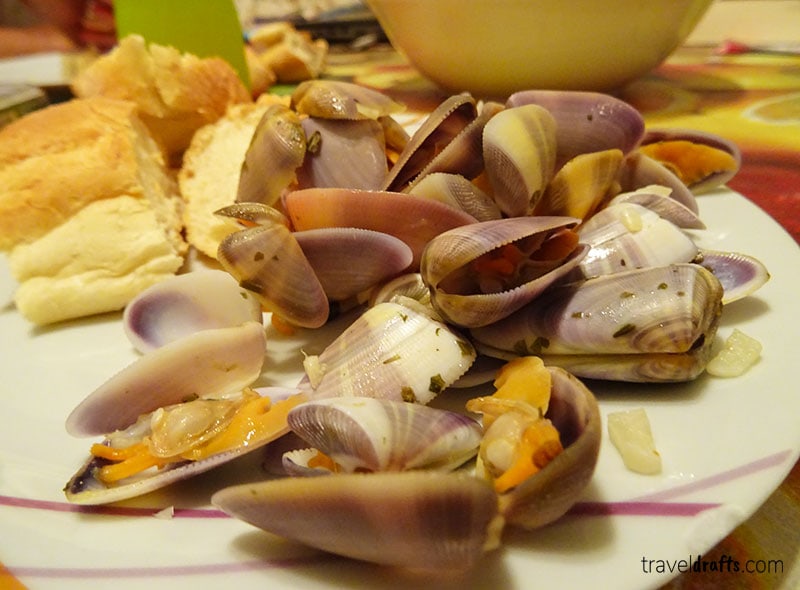#Traditional Portuguese food – Best dishes to eat in Portugal

Table of Contents
“#Traditional Portuguese food – Best dishes to eat in Portugal”
All these events impacted Portuguese cuisine and also left a trace of our cuisine in the world. Piri-Piri, our pastry, fios de ovos, tempura, tea, Piri-Piri chicken, Pan de castella are some of the examples of our influence in world cuisine. Here we will explore the aspects of Portuguese cuisine in general, but mostly the typical Portuguese foods in particular.

One of the most important things you need to bear in mind is that Portuguese love food! We easily do hundreds of kilometers just to eat a specific dish or go to a particular restaurant. Plus, we are always thinking about the next meal – even while eating. So, food is a big deal in Portugal! It is always a good opportunity to join family and friends on a traditional Portuguese dish. Oh, we forgot to mention, to the Portuguese, there’s nothing like the Portuguese food, it’s the best in the world.
As Portuguese foodies and with extensive knowledge of Portuguese food (we do eat several times a day…), we created this guide to help you understand better the traditional Portuguese cuisine.
What should you know about traditional Portuguese food?
Each region has its own traditional dishes
Although Portugal is a very small country, each region has its typical plates creating a huge variety of dishes and an extremely diverse culinary. In the North of Portugal, the food is typically heavy – it’s farmer’s food, like Feijoada, Cozido and different kinds of sausages. By the coast, fish and seafood are predominant so you’ll see plenty of grilled Sardines, clamshells, and octopus. Some of the typical dishes of the south of Portugal are Açorda, Sopa da Pedra, and Xarém.

Basic ingredients of traditional Portuguese cuisine
Portugal produces exceptional olive oil and we use it in abundance. Olive oil is used in everything salads, stir-frying, dressing food, or simply to dip bread. We are lucky, we have the opportunity to use top-quality olive oil in every meal.
Portuguese use onion and garlic in everything, moreover I think it’s safe to say that we don’t know how to cook without onion and garlic. Portuguese traditional food isn’t spicy, we don’t use too many condiments, most of the times only salt. Apart from some dishes, Portuguese traditional food is healthy – it is regarded as part of the Mediterranean diet with plenty of fruit and vegetables, fish and olive oil.

Cod’s special place in Portuguese cuisine
Portugal is the 3rd highest per capita fish consumption in Europe, and codfish is the main reason for it. Portuguese love codfish, but salted cold, we even say that there are more than 365 ways to cook cod (in Portugal Cod is Bacalhau). One for each day of the year… We never counted them, but we believe that there are even more!
Cod/Bacalhau is so important in Portuguese food, that Portuguese don’t even regard cod/bacalhau as a fish! It has its own category, there is fish, meat, and cod/Bacalhau.
What to eat in Portugal – Best Traditional Portuguese dishes
Typical Portuguese snacks
Chouriço
Chouriço is a traditional sausage that is cured, smoked and fermented. It is mostly made with pork, fat, salt, red pepper paste, garlic, and wine. There is a wide variety of Chouriços, and each region or even families have their own recipes and use different seasonings. Traditionally, the best chouriços come from Trás-os-Montes and Alentejo.
There is a black Chouriço called Morcela, which is made with pork meat and blood and is also very tasty. We advise you to try several varieties of chouriços, don’t be afraid of experiencing all the different tastes!
Chouriço is usually eaten as a snack or appetizer, before the main meal. Portuguese may roast them in a typical clay plate, called the assador.
Don’t mistake chouriço for chorizo, the Spanish version. They are similar but not the same. Although it is a typical Iberian food, each country has their own versions. The Spanish chorizo tastes different from the Portuguese chouriço.

Alheira – a unique Portuguese sausage
Alheira is a type of smoked sausage but made with poultry (instead of pork) and connected with bread and fat. Opposite to chouriço which you don’t need to cook, an alheira must be fried for a few minutes. It is good as a snack or even as a main meal with fried egg and chips. You’ll find them everywhere but they are really traditional in Trás-os-Montes. The most famous Portuguese alheiras come from Mirandela but the ones from Vinhais and Boticas are equally good.
The story behind alheiras is very interesting. They were created by the Jews, during the Portuguese Inquisition. To prove to the community that they had converted to Christianity they created a Sausage – the Alheira, a poultry sausage instead of the forbidden pork. People thought that they were eating pork when they were, in fact, eating poultry.
Bolinhos de Bacalhau
Bolinhos de Bacalhau are one of the most typical snacks of Portugal. They are made of Portugal’s favorite ingredient, Bacalhau (cod). They are deep-fried fish cakes, made of codfish, potatoes, onion, parsley, and eggs. It is simply fantastic to eat a Bolinho de Bacalhau with a fresh soda or a beer. You can’t really have a picnic in Portugal without having Bolinhos de Bacalhau.
Top tip: You will find restaurants selling different types of Bolinhos de Bacalhau, with cheese or other ingredients, but these aren’t typical Portuguese. The best

Bifana
Bifana is one of Portugal’s best sandwiches, it is a pork steak sandwich seasoned with garlic and a spicy sauce. It is simply mouthwatering. The sauce is obviously the secret of this sandwich. Normally you can find these sandwiches in food stalls in fairs, festivities or in some specific restaurants.

Although they originated in Vendas Novas, Alentejo, you are able to find them all over Portugal, with slight differences. In the North of Portugal, they are a bit different, the pork steak is cut into extremely thin pieces and they are seasoned in a big pot of spicy sauce and placed in a small bread roll along with the sauce. In the South of Portugal, the steak isn’t cut into small pieces and the sauce isn’t as spicy, they are served simple in a bigger bread with a touch of mustard.

Olives
A plate of olives seasoned with garlic and olive oil is served as an appetizer, in almost every restaurant. They are simply addictive and very difficult to resist while waiting for the main dishes. As we said before Portugal has pretty good olives and you will find many different kinds – some are small and sour and others are big and full-bodied.
Typical Portuguese soups
Caldo Verde
Caldo Verde is one of the most traditional dishes in Portugal. It literally means green soup and it is comfort food. Originated in Minho, in the north of Portugal this soup is cooked with thinly cut Couve Galega (a type of cabbage), onion, garlic, potato, and chouriço/Salpicão and served with Broa de Milho (cornbread).
It may sound simple, but it’s very good. If you have the opportunity to have a good Caldo Verde, you won’t be disappointed.
Canja de Galinha
Canja de Galinha is chicken soup, the soup you eat when you are sick. Every country has a version of this soup. In Portugal, it is made with chicken (sometimes with chicken liver and heart) and chicken broth, rice or small pasta.
Sopa da Pedra – Stone Soup
Sopa da Pedra means stone soup, yes literally made with stone, but also with several types of meat, chouriço, beans, cabbage, potatoes, and carrot. This traditional dish is typical of Almeirim in Santarém, in the South of Portugal. It is a very rich and satisfying soup. Actually, Sopa da Pedra may look more like a stew and you won’t want to have anything else after eating a typical Sopa da Pedra in Almeirim.
Legend says that this soup was created by a monk passing by the village of Almerim who was starving. He asked each person in the village for only one ingredient so he could do his stone soup. The people were so curious about this soup made with stones that they gave him the ingredient just to see how could he make soup with stones. He used every ingredient received making a rich, hearty and delicious soup and then put one stone in it.
In Almeirim, they still serve the soup with a stone inside.

Açorda Alentejana
Açorda is a traditional dish from Alentejo, but you will find many variations of this dish. With several different ingredients, more or less liquid, but the base of the dish is the bread. This dish was created as a way to re-use stale bread by the Morish when they occupied the Iberian Peninsula.
The soup is made with garlic, salt, bread, olive oil, and water, poured on top of the bread. In the end, a poached egg is added as well as a hand full of coriander. The bread soaks the delicious liquid of the soup.
What is The National dish of Portugal?
Portugal doesn’t have one National dish! On the other hand, any dish with salted Cod is Portugal’s National dish, the Portuguese simply love it and it is part of our history. Ironically codfish aren’t fished on the coast of Portugal, but in the North in the Norway sea and near Newfoundland. As cod was a good fish to dry, during the Portuguese discoveries the ships were packed with dry cod because it would last for years. Later on, with the refrigeration process salted cod became very cheap, and as a poor country, we adopted salted cod as our main protein.
Note: Be aware, that in Portugal there is no such thing as fresh cod, only salted. So, to cook dry cod you need to soak the cod in fresh water for several days, or it will be very, very salty.
Bacalhau Assado com Batatas a Murro (Roasted Cod with punched potatoes)
Roasted Cod with potatoes is a classic Bacalhau dish. The Cod is roasted in the oven with garlic, bay leaves and a generous portion of olive oil for at least one hour with small new potatoes with skin. In the end, you must give a small punch on the potatoes and add more olive oil. This is probably the most traditional dry cod dish.

Bacalhau à Bras
Bacalhau à Brás is one of Portugal’s most loved recipes of Bacalhau. It is made with shreds of cod, very small and thin fried potatoes, onions involved with mixed eggs. Everything is stir-fried and, in the

Bacalhau com Natas (Dry cod with cream)
Bacalhau com Natas isn’t one of the most traditional recipes but it is very popular and it is a staple dish in several restaurants. Although Portuguese cuisine doesn’t use cream and cheese frequently, this luscious recipe has plenty of both. It consists of shreds of cod and potatoes boiled in milk and then roasted in the oven topped with cheese.
Typical Portuguese dishes – fish and seafood dishes
Grilled Sardines
Sardines are an oily fish packed with flavor. This simple dish is cooked by grilling the sardines on a hot grill. It is mostly served in the summer, particularly during the Popular Saints festivities. Normally it is eaten with a slice of cornbread and roasted red peppers. We could have included this in the snacks or street food headings too.
Sardines are one of the most abundant fish in the Portuguese coast, it is one of the most popular and typical dishes in Portugal.

Ameijoas à Bulhão Pato (Clams)
Ameijoas à Bulhão Pato is one of those dishes that makes us salivate merely by thinking about it. This traditional Portuguese dish is light and perfect to eat in Summer after coming from the beach, preferably on a terrace. It consists of stir-fried fresh clams, garlic, olive oil then adding lemon juice and coriander. Make sure you have bread to dip it in the sauce.

Choco Frito com Arroz de Tomate (fried cuttlefish with tomato rice)
Choco Frito with tomato rice is a traditional Portuguese food from Setubal, and an example of a dish you simply have to eat it where it is the best. This dish is made with fried cuttlefish involved in egg and flour (it is similar to calamari) and then served with very humid tomato rice.
In Portugal, this kind of humid rice is called “

Arroz de Marisco (Seafood rice)
Arroz de Marisco is a traditional dish very appreciated by the Portuguese, normally eaten at a festival or important days. The dish consists of a combination of several sorts of seafood like shrimp, clams, cockles, mussels, and lobster. The rice is slowly cooked in a seafood broth, and in the end, the seafood is added. The rice should be very humid, as we referred above the so-called “arroz malandro”. This is also a dish very easy to find in Portuguese restaurants, but try to taste it in a restaurant that specializes in seafood.

Polvo à Lagareiro (Octopus)
Polvo à Lagareiro is a traditional Portuguese food made with octopus and potatoes. Any octopus lover will be delighted with this dish. After being cooked for 1 hour, the octopus is roasted in the oven with punched potatoes and a huge amount of olive oil. The octopus is tender and silky, and the olive oil makes it so decadent, you will love it.
There are several other good dishes with octopus in Portugal, like a green sauce with octopus, octopus stew… Try to eat a few of them, you won’t regret it. Though our favorite is Polvo à Lagareiro.
Note: You may also find Bacalhau à Lagareiro, which is a very similar dish but made with cod, instead of Octopus. It’s also very good if you are fond of salted cod.

Best Portuguese main dishes – Meat
Cozido à Portuguesa (Portuguese stew)
Cozido à Portuguesa is the mother of all traditional Portuguese food! It is a slow-cooked dish made with a variety of vegetables like carrots, onions, potatoes,
Cozido à Portuguesa is traditionally a Sunday dish in Portugal, but it’s very difficult to find in restaurants, and unfortunately, it’s even more difficult to find good ones.

Feijoada à transmontana
Feijoada, that literally means beans, is another traditional Portuguese dish from the north of Portugal, more specifically from Trás-os-Montes. The dish is made mainly of red beans, different cuts of pork meat (ear, trotter, nose) and then several cured sausages like chouriço, salpicão. Traditionally feijoada is eaten on the Sunday after Carnaval, that it is called Domingo Gordo (Fat Sanday), where you can make a pig of yourself before fasting for Easter.
This is one of our favorite Portuguese traditional dishes on this list, but similarly to Cozido, it’s not easy to find in restaurants and even harder in tourist areas. Though it’s worth searching for a good Feijoada restaurant just to try it out!

Leitão à Bairrada
Leitão à Bairrada is a roasted piglet cooked in a wood-fired oven. It is a succulent piglet with crispy skin typical of the region of Bairrada in the center of Portugal. This is the kind of dish that you should eat only in the Bairrada region (Mealhada, Anadia) or in very specific restaurants. It has to be prepared and cooked in a very particular way for it to be truly good.
Leitão is served with chips, salad and a spicy sauce made with the fat of the piglet to dip your fries and season the Leitão. Most restaurants also serve sandwiches of Leitão which are also very tasty.
Important note: Please don’t supermarket leitão, it’s horrible. If you are trying leitão, you have to try it the right way.

Carne de Porco à Alentejana
By now you probably have noticed that the Portuguese have plenty of traditional foods with Pork, but this dish has to be on your shortlist and won’t disappoint you. This is a Portuguese surf and turf!
A carne de porco à alentejana is made with pork meat and clams, combined with fried potatoes. The dish is seasoned with garlic, paprika, red wine, bay leaf, and coriander. This is traditional Portuguese food at its best! Curiously, this dish is from Algarve despite the name saying it is from Alentejo. This happens because Alentejo is well known for its good quality pork.

Frango Churrasco (Piri Piri Chicken)
Portuguese Frango de Churrasco, aka Piri Piri Chicken, is one of Portugal’s most famous foods, and you are able to find it all over the world, in restaurants like Nando’s or Oporto (Australia). For those who haven’t tried, Frango de Churrasco (or Piri-Piri Chicken) is a succulent roasted chicken on a hot grill and is seasoned with a hot Piri-Piri sauce (It’s is a type of chili). Frango de Churrasco is a meal that people eat quite frequently in Portugal, there are tons of places that sell it, although you won’t find Nando’s (the most famous chain) in Portugal.
This universal Portuguese dish isn’t exactly from Portugal but Moçambique, which was a colony of Portugal. It was created in Moçambique where the Piri-Piri is originated. The Portuguese love it so much and started opening Piri-Piri chicken restaurants everywhere, in Portugal and the rest of the world.
Best Portuguese desserts
Pastel de Nata and Pastel de Belém
Pastel de Nata is easily the most famous Portuguese dessert. It is a crunchy tart made with a delicious egg cream that is roasted in the oven and topped with cinnamon and/or icing sugar. This traditional Portuguese dessert was created in Lisbon by the monks of the Jerónimos Monastery.
Is there a difference between Pastel de Nata and Pastel de Belém? Pastel de Nata is sold all over Portugal but Pastel de Belém is only sold in Belém, Lisboa, right next to the Jerónimos Monastery. Pastel de Belém is the original Portuguese tart and its recipe is a secret. They are only slightly different from most of the Pastel de Nata.

Ovos Moles
Ovos Moles means soft eggs and it is a dessert made of egg yolks and sugar covered by wafers. This is a traditional dessert of Aveiro in the center of Portugal and it is designated a product with Protected Geographical Indication by the European Union. Ovos moles are sold in different shapes like shells, fish, and Moliceiros (a typical boat of Aveiro). It may sound weird but it is good, so good…
In Portugal, most of the desserts are made with Ovos Moles paste (yolks and sugar). In the past, convents and monasteries were the creators and producers of these sweets. Why? They used egg whites to iron their habits, so there was a surplus of egg yolks. These were later were used to cook desserts. There are hundreds of varieties of these sweets, but they are all are designated as “Doçaria Conventual”, which means literally sweets from convents.

Bolo Rei
Bolo Rei or Kings Cake is a traditional Portuguese cake eaten in Christmas and the Epiphany. Although nowadays you are able to find Bolo Rei year around. The cake is made of soft dough with nuts, dried fruit and covered with crystallized fruit. Tradition says that the one who finds the fava bean in the cake has to pay the Kings Cake next year.
Honestly, I don’t like it… the dough is too dry and crystallized fruit…? Nah… But it is very, very traditional!

Pão de Ló de Ovar
Pão de Ló is a sponge

Final thoughts on Portuguese Cuisine
Don’t be afraid to try different things and give an opportunity to discover all the delicious Portuguese dishes. It is very easy and cheap to eat in Portugal. Like everywhere else in the world, always try to eat where the locals are eating, they know all the best places. Some of these (and other) traditional dishes are very regional specific and best found in certain regions.
Anyhow, in Portugal, you will eat like a king, the food is luscious, tasty and it won’t break your wallet.
If you liked the article, do not forget to share it with your friends. Follow us on Google News too, click on the star and choose us from your favorites.
For forums sites go to Forum.BuradaBiliyorum.Com
If you want to read more Like this articles, you can visit our Trip & Travel category.



